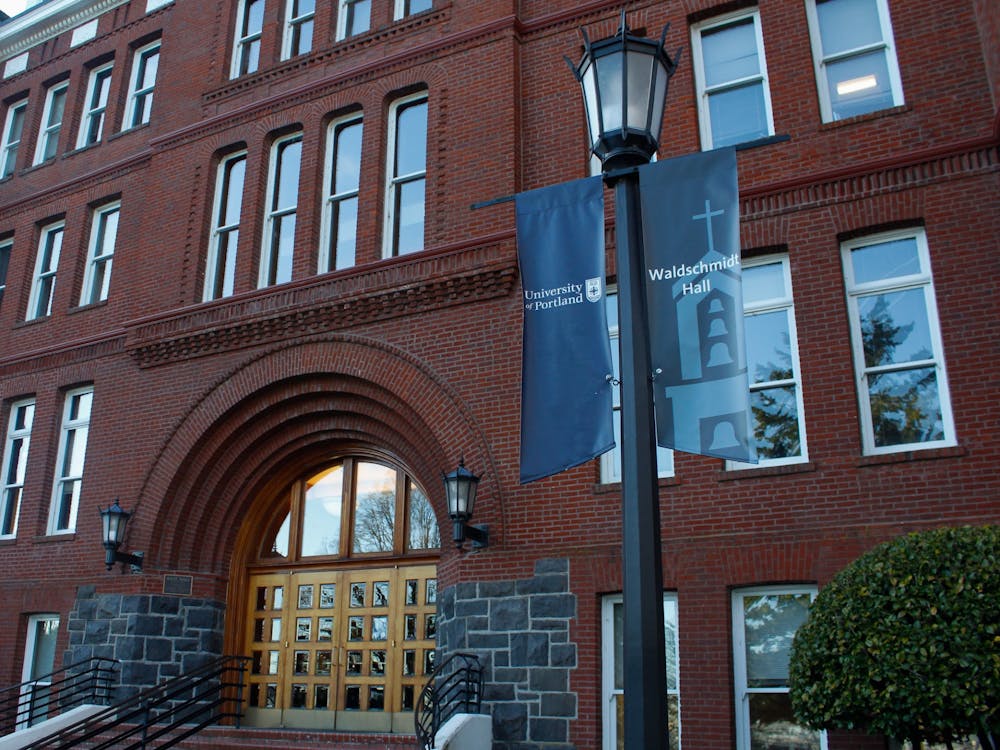All institutions receiving federal funding are mandated by the Department of Education to acknowledge Constitution Day on Sept. 17.
The university fulfilled the mandate by providing an opportunity for students to attend a lecture given by political science professor Bill Curtis.
The event, titled “The Constitution and the Culture War: Cases from the ‘24-’25 SCOTUS Term,” covered four major Supreme Court cases from the past year and the implications of the legislation that passed as a result.
As students filled the seats of Shiley 319, Curtis passed out mini Constitutions to the students who could name one Supreme Court justice or Supreme Court case.
Constructive Dialogue, an initiative dedicated to creating space for students and faculty to openly discuss relevant issues, sponsored the talk. After some brief hubbub, Professor Anne Santiago, Dundon-Berchtold Institute fellow for Constructive Dialogue, introduced Curtis and the lecture began.
“Happy Constitution Day, everybody,” Curtis said. “I have way too much material for today, but in my defense, welcome to the second Trump administration.”
There were 67 court rulings in the 2024-2025 judicial term. Curtis focused on four of these cases, all of which concerned controversial topics in modern U.S. politics.
He also defined a few key terms such as substantive due process, the equal protection clause and tiers of scrutiny.
“They’re kind of hot-button cases,” Curtis said. “So that’s why the name of the talk is the constitution and the culture war.”

A student asks a question to Curtis. On Sept. 17, Curtis gave a Constitution Day lecture to students, staff and faculty.
Mahmoud v. Taylor
There were many complaints from parents in a Maryland school district who were religiously opposed to their children being exposed to LGBTQ+ inclusive storybooks. The school board refused to allow them to opt their children out of classes where the storybooks were presented, after allowing the option in the past.
The school board made this decision on account of student absenteeism and classroom disruption, while permitting them to also opt out of subjects like sexual education.
“What happened was, and this is fairly clear in the record, that the board was like, ‘All of our students that go to our public schools, they need to know there was discrimination against LGBTQ+ people,’” Curtis said. “[The students] don’t have to abandon their faith, but they have to know about it.”
According to the Oyez judicial archive, the question posed to the Supreme Court was, “Do public schools burden parents’ religious exercise (under the First Amendment) by forcing students to be exposed to themes that violate their religious beliefs?”
Parent petitioners argued they had the right to freely exercise their religious beliefs inside the classroom, on the basis of past cases like Wisconsin v. Yoder.
In this 1972 case, the court sided with the party arguing for free exercise under the First Amendment using a strict scrutiny analysis, or an analysis where the Supreme Court closely reviewed the case as it dealt with fundamental rights.
“They did a strict scrutiny analysis,” Curtis said. “They recognized that the education of young people is a compelling government interest, but it was still overcome by the free exercise right in this case.”
The concurrence, which means the final agreement by the court, came from Justice Clarence Thomas, who said that the curriculum represented an impermissible attempt at ideological conformity.
According to Curtis, the schools were inconsistent in their allowing opt-outs for other subjects, but not for the topic of gender and sexuality. This inconsistency led to the school board’s loss of the case.
“Justice Sonya Sotomayor proposed in the dissent that the LGBTQ+ curriculum themes weren’t a real threat of undermining the religious faiths of the children, but rather mere exposure,” Curtis said. “Therefore, it does not constitute a free exercise violation.”
Ultimately, the court decided in (6-3) favor of the parents by citing that the parents’ right to exercise religion under the First Amendment was burdened by the state’s failure to provide notice and opt-out options whenever the storybooks were presented.
United States v. Skrmetti
There are 20 states in America that have restrictions on gender-affirming care for minors. The laws include exceptions for certain medical conditions but restrict gender-affirming care for treating gender dysphoria.
United States v. Skrmetti was a lawsuit, where the Biden Department of Justice challenged the state of Tennessee for denying gender-affirming care to transgender minors and discriminating against transgender youth on the basis of sex.
Groups of transgender youth, their parents and health care providers sued on the basis that these restrictions violated the 14th amendment: the equal protection clause.
The question posed to the court was: “Do laws restricting certain medical treatments for transgender minors violate a protection clause?”
The majority opinion was six to three, meaning six justices sided with Jonathan Thomas Skrmetti, attorney general and reporter for Tennessee, while three justices sided with the U.S., represented by the Biden Administration.
“So six in the majority, three in dissent, and in every one of these cases, spoiler alert, it’s the Republican-appointed six versus the Democrat-appointed three,” Curtis said.
The court applied that Tennessee's laws classified the ban around age and medical needs, and therefore did not violate the equal protection clause due to discrimination based on sex.
Justices Clarence Thomas and Amy Coney Barrett provided the concurrence. Barrett stated that transgender people do not constitute a suspect clause, which is a category that distinguishes groups that have historically been subject to prejudice.
She deemed the transgender community unable to be protected under the equal protection clause, which protects groups that have suffered prejudice due to their race, nationality or religion.
Barrett also stated that the medical professionals involved in the lawsuit had allowed their political ideologies to influence their guidance on providing medical care to transgender youth.

An audience member asks a question. On Sept. 17, Curtis gave a Constitution Day lecture to students, staff and faculty.
Free Speech Coalition v. Paxton
Texas passed a law that websites and social media platforms, whose content is one-third or more pornographic, are deemed potentially harmful to youth. Therefore, they must implement age verification methods to limit user access and display specific health warnings on their landing pages and advertisements.
The Free Speech Coalition, a non-profit sex industry trade association, sued on the basis this law violated the First Amendment right of free speech.
“The concern here is that the Free Speech Coalition wants the porn industry to be free,” Curtis said. “But the concern among civil libertarians, who really care about free speech, is that this is going to be a burden to adults who have a First Amendment right to view these materials on the internet without having to release personal information.”
The question posed to the court was: “Is a Texas law that requires any website to publish content one-third or more which is ‘harmful to minors’ to verify the age of each of its users before providing access subject to ‘rational basis’ review or ‘strict scrutiny’?”
Thomas concurred that the subject constituted neither rational basis nor strict scrutiny, but intermediate scrutiny. This means the case topic was more significant to the court than one of rational basis, but not as much as a case analyzed with strict scrutiny.
“Didn’t see that one coming, right?” Curtis said.
The scrutiny classification came from Texas’ interest in reconciling children’s protection with adult access rights. Further evidence of Texas’ law is that similar requirements exist for in-person purchases.
The majority agreed with Thomas’ concurrence, with the minority dissent arguing that strict scrutiny should apply since the law burdens adults' access to protected speech.
Trump v. CASA
President Trump issued an executive order titled “Protecting The Meaning And Value Of American Citizenship.” The order declared that certain individuals born in the U.S. would not be granted U.S. citizenship at birth if their mothers were either in the country illegally or temporarily and if their fathers were not U.S. citizens or lawful permanent residents.
“This order violates the birthright citizenship clause of the 14th Amendment,” Curtis said. “The amendment states that people born on American soil, under the subject of the jurisdiction of the United States, have citizenship.”
Multiple federal district courts filed lawsuits, arguing that the order violated the Constitution and the Immigration and Nationality Act. They then issued preliminary injunctions, which temporarily blocked the enforcement of the executive order nationwide.
“What [the district courts] are saying is, ‘We’re not going to allow the government to enforce the executive order while we’re still figuring things out,’” Curtis said.
The federal government appealed the injunction, stating that the lawsuit should only apply to specific plaintiffs and not the entire country.
According to Oyez.org, the question posed: “Can a district court issue a nationwide injunction that blocks enforcement to a federal executive order beyond the specific parties involved in the lawsuit?”
“So the question is, what power do these lower courts have?” Curtis said.
Barrett stated there is a lack of historic precedent for universal injunctions, so district courts cannot extend their power from regional action to the federal level.
“With the Trump administration doing a bunch of stuff, there are more courts feeling like they have to issue [injunctions] because constitutional rights are at stake,” Curtis said. “For instance, birthright citizenship. But not everybody who’s affected by the order can rush into the court.”
Although the order was significantly burdensome to many in the United States, the district courts made premature legislation they did not have the authority to do.
“Barrett accused [Justice Ketanji Brown Jackson] of rejecting the imperial presidency and embracing the imperial judiciary,” Curtis said. “For allowing one district court somewhere to shut down the entire agenda of the executive.”
The concurring majority opinion was that courts cannot expand certain powers to a nationwide ruling, meaning the courts did not have the authority to overrule an executive order the way they did.
Clara Pehling is a news reporter at The Beacon. She can be reached at pehling28@up.edu.








